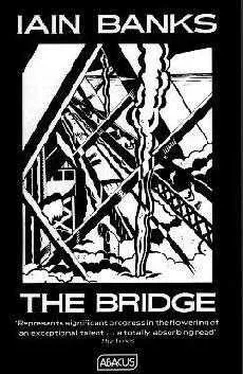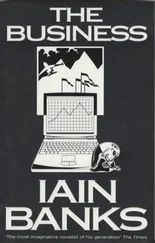They left me here eventually, after the mountains and the hills and tundra and another, lower, colder plain. Here is the Republic, a cold, concentric place once known, they say, as The Eye of God. It is reached, from the barren plain, by a long causeway which divides the waters of a huge grey inland sea. The sea is almost perfectly circular, and the large island at its centre is also very close to that same geometric shape. The first I saw of it was the wall; the grey sea wall skirted by low surf and topped by low towers. It seemed to stretch curving away for ever, vanishing in a haze of distant rain squalls. The train clattered through a long tunnel, over a deep moat of water and then another wall. Beyond lay the island and the Republic, a place of wheatfields and wind, low hills and grey buildings; it seemed at once rundown and full of energy, and those grey buildings gave way, every now and again, to immaculate palaces and temples of an obviously earlier age, perfectly restored but seemingly unused. And there was a graveyard, a cemetery miles to each side, packed with millions of identical white pillars spread geometrically across a green sea of grass.
I live in a dormitory with a hundred other men. I sweep leaves from the broad paths of a park. Tall grey buildings rise on all sides, bulking square shapes against the grainy, dusty-blue sky. There are spires and thin towers on top of the buildings; banners I cannot read fly from them.
I sweep the leaves even when there are no leaves to sweep; it is the law. I formed the impression when I first came here that this was a prison, but this is not the case, at least not in the obvious sense. It seemed then that everybody I met was either a prisoner or a guard, and even when I was weighed and measured and inspected and given my uniform and taken by bus to this large, anonymous town that nothing had really changed. I could talk to relatively few people - this came as no surprise, of course - but the ones I did talk to seemed delighted that I could speak to them in my strange, alien tongue, but also rather guarded when talking about their own circumstances. I asked them if they had heard about the bridge; some had, but when I said I came from there they seemed to think I was joking, or even that I was mad.
Then my dreams changed, were taken over, invaded.
I woke up one night in the dormitory; the air was sick with the smell of death, and choked with the sounds of people moaning and crying out. I looked through a broken window and saw the flashes of distant explosions, the steady glow of large fires, and could hear the crump of falling shells and bombs. I was alone in the dormitory, the sounds and smells came from outside.
I felt weak and desperately hungry, more hungry than I had felt on the train which had taken me away from the bridge. I discovered I had lost almost half my weight during the night. I pinched myself and bit the inside of my cheek, but I did not wake up. I looked round the deserted dormitory; the windows had been covered in tape; black and white tape made X's all over the rectangular panes. Outside, the town was burning.
I found some ill-fitting shoes and an old suit where my standard-issue uniform should have been. I went out into the town. The park which I was supposed to sweep was there, but covered in tents and surrounded by ruined buildings.
Planes droned overhead, or came hurtling down out of the cloudy night sky, screaming. Explosions shook the ground and air; flames leapt into the sky. Everywhere was rubble and the smell of death. I saw a dead, skinny horse, fallen in its traces, the cart behind it half-covered by the ruins of a fallen building. The horse was being carefully butchered by a group of thin, wide-eyed men and women.
The clouds were orange islands against the ink-black sky; fires reflected there on the hung vapour, and sent huge columns of their own darkness into the air to meet them. The planes wheeled, like birds of carrion over the burning town. Sometimes a searchlight would pick one out, and a few black puffs of smoke would darken the sky around the plane still further, but it seemed that otherwise the town was defenceless. Occasionally shells shrieked overhead; twice explosions nearby made me duck for cover as debris - dusty bricks, shards of stone - fell pattering and thumping around me.
I wandered for hours. Towards dawn, as I was returning to the dormitory through this unending nightmare, I found myself behind two old people, a man and a woman. They were walking along the street, each supporting the other, when the man suddenly crumpled and fell, taking the old lady down with him. I tried to help them up, but the man was already dead. There had been no bombs or shells for several minutes, and though I thought I could hear distant crackling small-arms fire, none of it was near us. The woman, almost as thin and grey looking as the old dead man, cried hopelessly, sobbing and moaning into the worn collar of the old man's coat, slowly shaking her head and repeating over and over some words I could not understand.
I did not think the shrivelled old could contain so many tears.
The dormitory was full of dead soldiers in grey uniforms when I returned. One bed was unoccupied. I lay down on it and woke up.
It was the same peaceful, intact town, with the same trees and paths and tall grey buildings. I was still here. The buildings I had seen in flames or in ruins were those that overlooked the park where I worked. When I looked carefully though, in some places I found stones which had not been restored, and which were part of the original buildings. Some of those blocks were chipped and scarred with the distinctive, but weathered, marks of bullets and shrapnel.
I had similar dreams for weeks; always much the same, never exactly similar. Somehow I was not surprised when I discovered that everybody had these dreams. They were surprised; surprised that I had never had such dreams before. I cannot understand, I tell them, why they seem frightened of their dreams. That was the past, I say, this is the present; the future will be better, it won't be the past.
They think there is a threat. I tell them there isn't. Some people have started to avoid me. I tell the people who will listen that they are in prison, but the prison is in their own heads.
I sat up drinking far too much spirit with my workmates last night. I told them all about the bridge and that I had seen nothing threatening to them on my long journey here. Most of them just said I was crazy and went to bed. I stayed up too late, drank too much.
I have a hangover now, at the start of the week. I pick up my brush from the depot and head into the chilly spaces of the park, where the leaves lie, damp or frozen on the ground according to where the sunlight falls. They are waiting for me in the park; four men and a big black car.
In the car two of them hit me while the other two talk about the women they screwed that weekend. The beating is painful but not enthusiastic; the two men administering it seem almost bored. One of them cuts a knuckle on my teeth and looks annoyed for a moment; he takes out a knuckleduster, but one of the other men says something to him; he puts it away again and sits sucking at his finger. The car screams through the wide streets.
The thin, grey-haired man behind the desk is apologetic; I wasn't supposed to be beaten up, but it's standard procedure. He tells me I am a very lucky man. I dab at my bloody nose and puffy eyes with my monogrammed hanky - still, miraculously, not stolen - and try to agree with him. If you were one of ours, he says, then shakes his head. He taps a key on the surface of his grey metal desk.
I am somewhere in a large underground building. They blindfolded me in the car, on the road between the town and whatever city this is. I know it is a city because I heard its noises, and we drove through it for an hour before the car dipped into some echoing underground space, spiralling down and down into the earth. When it stopped I was led out of the car and along innumerable curving corridors to this room, where the thin, grey-haired man was waiting, tapping his grey desk with a key and drinking tea.
Читать дальше












